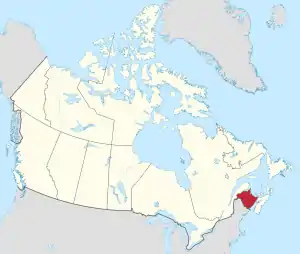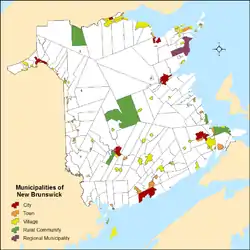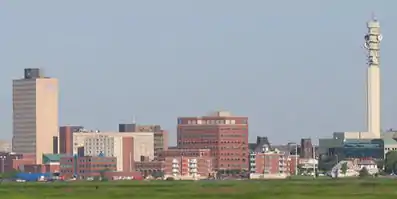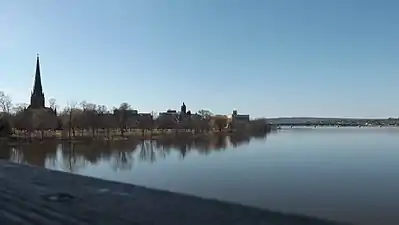List of municipalities in New Brunswick
New Brunswick is the eighth-most populous province in Canada with 747,101 residents as of the 2016 Census, and the third-smallest province in land area at 71,389 km2 (27,563 sq mi).[1] New Brunswick's 104 municipalities[2] cover only 9.8% of the province's land mass but are home to 68.9% of its population.


Municipalities in New Brunswick may incorporate under the Municipalities Act of 1973 as a city, town, village, regional municipality, or rural community.[3] Municipal governments are led by elected councils and are responsible for the delivery of services such as civic administration, land use planning, emergency measures, policing, road, and garbage collection.[4] New Brunswick has 8 cities, 26 towns, 61 villages, 1 regional municipality, and 8 rural communities.[4][5] Although rural communities are under the Municipalities Act, the provincial government distinguishes them from municipalities.[6]
In 1785, Saint John became the first community in what would eventually become Canada to incorporate as a city.[7] Moncton is New Brunswick's largest municipality by population with 71,889 residents and Saint John is the largest urban municipality by land area at 315.96 km2 (121.99 sq mi).[8] Approximately one-third of the residents of New Brunswick do not live in municipalities but reside in local service districts, which are unincorporated communities administered by the Minister of Environment and Local Government and have no local government of their own.[4]
Cities
The Lieutenant-Governor in Council may incorporate a town as a city under the Municipal Act if it has a population of at least 10,000.[3] Cities already in existence on January 1, 1967 continue to be incorporated regardless of population.[3] New Brunswick had eight cities that had a cumulative population of 275,965 in the 2016 Census.[8] Moncton is New Brunswick's largest city by population with 71,889 residents and Saint John is the largest by land area 315.96 km2 (121.99 sq mi) respectively.[8] Campbellton is New Brunswick's smallest city by population and land area with 6,883 residents and 18.58 km2 (7.17 sq mi).[8]
Towns
The Lieutenant-Governor in Council may incorporate a village as a town under the Municipal Act if it has a population of 1,500 or more, and provides a level of services that the Minister of Environment and Local Government considers appropriate.[3] Towns already in existence on January 1, 1967 continue to be incorporated regardless of population.[3] New Brunswick had 26 towns that had a cumulative population of 128,746 in the 2016 Census.[8] New Brunswick's largest town by population is Riverview with 19,667 residents and largest town by area is Sackville with a land area of 74.17 km2 (28.64 sq mi).[8] New Brunswick's smallest town by population is Nackawic with 941 residents and the smallest by land area is Saint-Quentin at 4.24 km2 (1.64 sq mi).[8]
Villages
New Brunswick's 61 villages had a cumulative population of 70,813 as of the 2016 Census.[8] New Brunswick's largest village by population is Memramcook with 4,778 residents and largest village by area is Belledune with a land area of 189.47 km2 (73.15 sq mi).[8] New Brunswick's smallest village by population is Meductic with 173 residents and the smallest by land area is Bath at 2.00 km2 (0.77 sq mi).[8]
Regional municipalities
New Brunswick's first and only regional municipality was incorporated on May 12, 2014.[9] The Regional Municipality of Tracadie was formed through the amalgamation of the former Town of Tracadie–Sheila, eighteen local service districts and portions of two other local service districts.[9] Regional municipalities must have a population greater than 15,000 and a community grouping that includes at least one municipality.[4] Regional municipalities elect a local council but are responsible only for community administration, planning and emergency measures services, and all services previously provided by any former municipality that is now part of the regional municipality.[4] The Province of New Brunswick is responsible for police protection and road services, unless the regional municipality chooses to assume these responsibilities.[4]
Rural communities
New Brunswick eight rural communities, an increase from four as of the 2011 census following the incorporations of Kedgwick in 2012, Cocagne and Hanwell in 2014, and Haut-Madawaska in 2017.[lower-alpha 1] These eight rural communities had a cumulative population of 23,265 in the 2016 Census.[8] New Brunswick's largest and smallest rural communities are Beaubassin East and Saint-André with populations of 6,376 and 772 respectively.[8] Rural communities elect local councils and are responsible for the delivery of some local services, including administrative services, community planning and emergency measures.[4] The province of New Brunswick ensures the delivery of other services including solid waste collection and recreation services unless the rural community chooses to take on these responsibilities.[4] Rural communities that include a former village or town are an exception, as they are responsible to provide all services that were previously provided by their former municipality.[4]
List of municipalities
 Skyline of Moncton, New Brunswick's largest municipality
Skyline of Moncton, New Brunswick's largest municipality Skyline of Saint John, New Brunswick's second largest municipality
Skyline of Saint John, New Brunswick's second largest municipality Skyline of Fredericton, New Brunswick's capital city and third-largest municipality
Skyline of Fredericton, New Brunswick's capital city and third-largest municipality
| Bathurst | City | 1912 | 11,897 | 12,275 | −3.1% | 92.04 | 129.3/km2 |
| Campbellton | City | 1888 | 6,883 | 7,385 | −6.8% | 18.58 | 370.5/km2 |
| Dieppe | City | 1952 | 25,384 | 23,310 | +8.9% | 54.05 | 469.6/km2 |
| Edmundston | City | 1952 | 16,580 | 16,032 | +3.4% | 106.85 | 155.2/km2 |
| Fredericton | City | 1848 | 58,270[15] | 56,224 | +3.6% | 132.57 | 439.5/km2 |
| Miramichi | City | 1995 | 17,537 | 17,811 | −1.5% | 179.47 | 97.7/km2 |
| Moncton | City | 1890 | 71,889 | 69,074 | +4.1% | 141.92 | 506.5/km2 |
| Saint John | City | 1785 | 67,575 | 70,063 | −3.6% | 315.96 | 213.9/km2 |
| Tracadie | Regional municipality | 2014[16] | 16,114 | 16,137 | −0.1% | 516.61 | 31.2/km2 |
| Beaubassin East | Rural community | 1995[17] | 6,376 | 6,200 | +2.8% | 291.08 | 21.9/km2 |
| Campobello Island | Rural community | 2010[18] | 872 | 925 | −5.7% | 39.67 | 22.0/km2 |
| Cocagne | Rural community | 2014[11] | 2,649 | 2,540 | +4.3% | 66.78 | 39.7/km2 |
| Hanwell | Rural community | 2014[12] | 4,700[15] | 4,740 | −0.8% | 151.32 | 31.1/km2 |
| Haut-Madawaska[lower-alpha 4] | Rural Community | 2017[13] | 3,714[19] | — | — | — | — |
| Kedgwick[lower-alpha 5] | Rural community | 2012[10] | 1,964[15] | 2,089 | −6.0% | 658.08 | 3.0/km2 |
| Saint-André | Rural community | 2006[20] | 772 | 819 | −5.7% | 8.04 | 96.0/km2 |
| Upper Miramichi | Rural community | 2008[21] | 2,218 | 2,373 | −6.5% | 1,835.40 | 1.2/km2 |
| Total cities | — | — | 276,065 | 272,174 | +1.4% | 1,041.44 | 265.1/km2 |
|---|---|---|---|---|---|---|---|
| Total regional municipality | — | — | 16,114 | 16,137 | −0.1% | 516.61 | 31.2/km2 |
| Total rural communities | — | — | 23,265 | 19,686 | +18.2% | 3,050.37[lower-alpha 6] | 7.6/km2 |
| Total towns | — | — | 128,746 | 129,311 | −0.4% | 636.49 | 202.3/km2 |
| Total villages | — | — | 70,813 | 73,047 | −3.1% | 1,775.98 | 41.0/km2 |
| Total municipalities | — | — | 514,953 | 510,355 | +0.9% | 7,020.89 | 73.1/km2 |
| Province of New Brunswick | — | — | 747,101 | 751,171 | −0.5% | 71,388.81 | 10.5/km2 |
See also
- Demographics of New Brunswick
- Geography of New Brunswick
- List of census agglomerations in Atlantic Canada
- List of communities in New Brunswick
- List of designated places in New Brunswick
- List of local service districts in New Brunswick
- List of municipal amalgamations in New Brunswick
- List of parishes in New Brunswick
- List of population centres in New Brunswick
- New Brunswick municipal elections, 2016
Notes
- Kedgwick was incorporated as a rural community through the amalgamation of the former Village of Kedgwick with the former local service district of the parish of Grimmer,[10] while Cocagne and Hanwell were previously local service districts.[11][12] Haut-Madawaska was formed in 2017 through the amalgamation of four villages (Baker Brook, Clair, Saint-François de Madawaska and Saint-Hilaire) with five local service districts (the parishes of Baker Brook, Clair, Lac Baker, Saint-François, and Saint-Hilaire) and a portion of a sixth local service district (the parish of Madawaska)[13]
- St. Stephen was incorporated as a town in 1871, but amalgamated with Milltown in 1973 and renamed St. Stephen-Milltown but the name reverted to St. Stephen in 1975.[14]
- Incorporated as St. Anthony but the name was changed to Saint-Antoine in 1969.[14]
- Haut-Madawaska incorporated in 2017 and is thus not represented in the 2011 census.
- Figures include the local service district of the parish of Grimmer which was incorporated with Kedgwick in 2012[10]
- This figure excludes the land area of Haut-Madawaska as it was not reported in the 2016 census having amalgamated in 2017.[13]
References
- "Population and dwelling counts, for Canada, provinces and territories, 2016 and 2011 censuses – 100% data". Statistics Canada. February 8, 2017. Retrieved February 11, 2017.
- "Welcome to the Association of Municipal Administrators of New Brunswick". The Association of Municipal Administrators of New Brunswick. 2015. Retrieved August 16, 2015.
- "Municipalities Act (R.S.N.B. 1973, c. M-22)". Government of New Brunswick. 1973. Retrieved April 24, 2015.
- "Types of Local Governments". Government of New Brunswick. 2015. Retrieved March 20, 2015.
- "Community Profiles". Government of New Brunswick. 2015. Retrieved January 17, 2016.
- "Municipalities (Cities, Towns, Villages) and Rural Communities". Government of New Brunswick. Retrieved January 6, 2016.
- "Provincial Archives of New Brunswick". Government of New Brunswick. 2015. Retrieved January 17, 2016.
- "Population and dwelling counts, for Canada, provinces and territories, and census subdivisions (municipalities), 2016 and 2011 censuses – 100% data (New Brunswick)". Statistics Canada. February 8, 2017. Retrieved February 11, 2017.
- "Establishing the Regional Municipality of Grand Tracadie-Sheila" (PDF). New Brunswick Department of Environment and Local Government. February 2014. Archived from the original (PDF) on July 21, 2017. Retrieved September 20, 2014.
- "Rural Community of Kedgwick Regulation – Municipalities Act" (PDF). Queen's Printer for New Brunswick. March 15, 2012. p. 2. Retrieved September 22, 2014.
- "Rural Community of Cocagne Regulation – Municipalities Act" (PDF). Queen's Printer for New Brunswick. March 28, 2014. p. 2. Retrieved September 22, 2014.
- "Rural Community of Hanwell Regulation – Municipalities Act" (PDF). Queen's Printer for New Brunswick. March 28, 2014. p. 2. Retrieved September 22, 2014.
- "New Brunswick Regulation 2017-3 under the Municipalities Act". Government of New Brunswick. March 20, 2017. Retrieved February 25, 2018.
- "Provincial Archives of New Brunswick". Government of New Brunswick. 2015. Retrieved March 6, 2015.
- "Population and dwelling count amendments, 2016 Census". Statistics Canada. January 16, 2018. Retrieved February 3, 2018.
- "Regional Municipality of Grand Tracadie-Sheila Regulation – Municipalities Act" (PDF). Government of New Brunswick Office of the Attorney General. March 28, 2014. p. 3. Retrieved September 17, 2014.
- "Rural Community of Beaubassin East Regulation – Municipalities Act" (PDF). Queen's Printer for New Brunswick. March 24, 1995. p. 6. Retrieved September 22, 2014.
- "Rural Community of Campobello Island Regulation – Municipalities Act" (PDF). Queen's Printer for New Brunswick. August 31, 2010. p. 2. Retrieved September 22, 2014.
- "Interim List of Changes to Municipal Boundaries, Status, and Names Up to January 1st, 2018" (PDF). Statistics Canada. November 14, 2018. pp. 23–24. Retrieved December 27, 2018.
- "Rural Community of Saint-André Regulation – Municipalities Act" (PDF). Queen's Printer for New Brunswick. May 26, 2006. p. 4. Retrieved September 22, 2014.
- "Rural Community of Upper Miramichi Regulation – Municipalities Act" (PDF). Queen's Printer for New Brunswick. March 17, 2008. p. 4. Retrieved September 22, 2014.